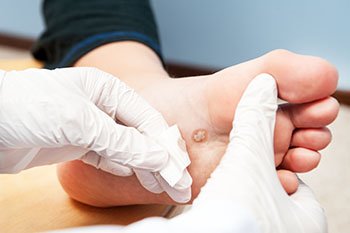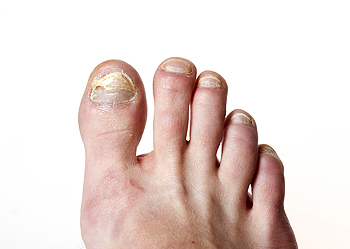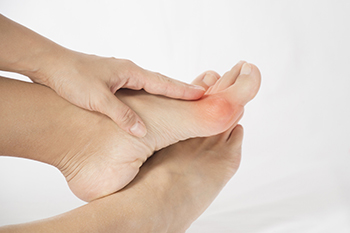
Dr. Kenneth Rosenthal
Dr. Jonathan C. O’Quinn
Dr. Michael J. Price

Dr. Kenneth Rosenthal
Dr. Jonathan C. O’Quinn
Dr. Michael J. Price
 The body experiences many changes during pregnancy, and one of the areas that is greatly affected is the feet. Foot pain is often a common problem that accompanies pregnancy and can occur for a number of reasons. Because pregnancy leads to weight gain that distributes differently throughout the body, the arch of the foot can flatten out and the feet can roll inwards while walking. Another common occurrence during pregnancy is swollen feet. This occurs because water tends to be retained more in the body and pools in the legs and feet. Ingrown toenails also frequently occur during pregnancy. The toenails are more likely to be pushed into the skin surrounding the nail when wearing tight fitting socks or shoes. If you are pregnant and dealing with any foot-related issues, consulting with a podiatrist could be very beneficial. A podiatrist will be able to help provide a variety of suggestions to help relieve your foot pain and can continue to monitor the health of your feet throughout your pregnancy.
The body experiences many changes during pregnancy, and one of the areas that is greatly affected is the feet. Foot pain is often a common problem that accompanies pregnancy and can occur for a number of reasons. Because pregnancy leads to weight gain that distributes differently throughout the body, the arch of the foot can flatten out and the feet can roll inwards while walking. Another common occurrence during pregnancy is swollen feet. This occurs because water tends to be retained more in the body and pools in the legs and feet. Ingrown toenails also frequently occur during pregnancy. The toenails are more likely to be pushed into the skin surrounding the nail when wearing tight fitting socks or shoes. If you are pregnant and dealing with any foot-related issues, consulting with a podiatrist could be very beneficial. A podiatrist will be able to help provide a variety of suggestions to help relieve your foot pain and can continue to monitor the health of your feet throughout your pregnancy.
Pregnant women with swollen feet can be treated with a variety of different methods that are readily available. For more information about other cures for swollen feet during pregnancy, consult with one of our podiatrists from Eastern Carolina Foot & Ankle Specialists. Our doctors will attend to all of your foot and ankle needs.
What Foot Problems Can Arise During Pregnancy?
One problem that can occur is overpronation, which occurs when the arch of the foot flattens and tends to roll inward. This can cause pain and discomfort in your heels while you’re walking or even just standing up, trying to support your baby.
Another problem is edema, or swelling in the extremities. This often affects the feet during pregnancy but tends to occur in the later stages.
How Can I Keep My Feet Healthy During Pregnancy?
If you have any questions please feel free to contact our office located in Greenville, NC . We offer the newest diagnostic and treatment technologies for all your foot and ankle needs.
 Plantar warts, which grow on the bottom of the feet, can be removed by freezing them off in a treatment called cryotherapy. During this procedure, the doctor cuts the wart with a small, sharp knife and then applies a freezing substance, such as liquid nitrogen, with a cotton swab or spray. Cryotherapy can hurt, and your doctor may use a local anesthetic to reduce pain. The treatment itself takes only a few minutes. Following the procedure, your foot may hurt for two to three days. A blister can form over the site of the wart but will typically disappear within a few days. There is a chance for minimal scarring. If you have a wart on the bottom of your foot, it is suggested that you consult a podiatrist to see if cryotherapy is the right treatment for you.
Plantar warts, which grow on the bottom of the feet, can be removed by freezing them off in a treatment called cryotherapy. During this procedure, the doctor cuts the wart with a small, sharp knife and then applies a freezing substance, such as liquid nitrogen, with a cotton swab or spray. Cryotherapy can hurt, and your doctor may use a local anesthetic to reduce pain. The treatment itself takes only a few minutes. Following the procedure, your foot may hurt for two to three days. A blister can form over the site of the wart but will typically disappear within a few days. There is a chance for minimal scarring. If you have a wart on the bottom of your foot, it is suggested that you consult a podiatrist to see if cryotherapy is the right treatment for you.
Plantar warts can be very uncomfortable. If you need your feet checked, contact one of our podiatrists from Eastern Carolina Foot & Ankle Specialists. Our doctors will assist you with all of your foot and ankle needs.
About Plantar Warts
Plantar warts are the result of HPV, or human papillomavirus, getting into open wounds on the feet. They are mostly found on the heels or balls of the feet.
While plantar warts are generally harmless, those experiencing excessive pain or those suffering from diabetes or a compromised immune system require immediate medical care. Plantar warts are easily diagnosed, usually through scraping off a bit of rough skin or by getting a biopsy.
Symptoms
Treatment
To help prevent developing plantar warts, avoid walking barefoot over abrasive surfaces that can cause cuts or wounds for HPV to get into. Avoiding direct contact with other warts, as well as not picking or rubbing existing warts, can help prevent the further spread of plantar warts. However, if you think you have developed plantar warts, speak to your podiatrist. He or she can diagnose the warts on your feet and recommend the appropriate treatment options.
If you have any questions please feel free to contact our office located in Greenville, NC . We offer the newest diagnostic and treatment technologies for all your foot and ankle needs.
 Thickened toenails that turn a yellow color can indicate that a toenail fungus has developed. Additional symptoms can include brittle nails, and in severe cases, the nail may turn black, and fall off. The fungus that causes this type of infection lives and thrives in warm and moist places, and is considered to be contagious. These can include public swimming pools, locker rooms, shower room floors, and surrounding areas. Additionally, wearing shoes and socks that are wet may significantly contribute to the onset of toenail fungus. An effective preventive technique is to wear appropriate shoes while in these areas, and it can help to wear shoes and socks that remain dry. If you have signs of a toenail fungus developing, it is suggested that you seek the counsel of a podiatrist who can offer you the right treatments for you.
Thickened toenails that turn a yellow color can indicate that a toenail fungus has developed. Additional symptoms can include brittle nails, and in severe cases, the nail may turn black, and fall off. The fungus that causes this type of infection lives and thrives in warm and moist places, and is considered to be contagious. These can include public swimming pools, locker rooms, shower room floors, and surrounding areas. Additionally, wearing shoes and socks that are wet may significantly contribute to the onset of toenail fungus. An effective preventive technique is to wear appropriate shoes while in these areas, and it can help to wear shoes and socks that remain dry. If you have signs of a toenail fungus developing, it is suggested that you seek the counsel of a podiatrist who can offer you the right treatments for you.
For more information about treatment, contact one of our podiatrists of Eastern Carolina Foot & Ankle Specialists. Our doctors can provide the care you need to keep you pain-free and on your feet.
Toenail Fungus Treatment
Toenail fungus is a condition that affects many people and can be especially hard to get rid of. Fortunately, there are several methods to go about treating and avoiding it.
Antifungals & Deterrence
Oral antifungal medicine has been shown to be effective in many cases. It is important to consult with a podiatrist to determine the proper regiment for you, or potentially explore other options.
Applying foot powder on the feet and shoes helps keep the feet free of moisture and sweat.
Sandals or open toed shoes – Wearing these will allow air movement and help keep feet dry. They also expose your feet to light, which fungus cannot tolerate. Socks with moisture wicking material also help as well.
If you have any questions please feel free to contact our office located in Greenville, NC . We offer the newest diagnostic tools and technology to treat your foot and ankle needs.
 Bunions are bony growths that appear on the outer side of the foot at the base of the big toe joint. This is a deformity that may cause pain, swelling, redness, and difficulty wearing shoes and while walking. When left untreated, bunions tend to progressively worsen over time. As a bunion grows, it pushes the big toe towards the smaller toes, changing the shape of the foot in the process. The misaligned big toe may then push the second toe out of alignment. Bunions can also lead to arthritis in the big toe joints. Bunions can be managed and their progression can be slowed through a variety of conservative treatments, such as footwear modifications. Surgery may also be an option and can permanently correct a bunion. If you suffer from bunions, it is suggested that you see a podiatrist for treatment.
Bunions are bony growths that appear on the outer side of the foot at the base of the big toe joint. This is a deformity that may cause pain, swelling, redness, and difficulty wearing shoes and while walking. When left untreated, bunions tend to progressively worsen over time. As a bunion grows, it pushes the big toe towards the smaller toes, changing the shape of the foot in the process. The misaligned big toe may then push the second toe out of alignment. Bunions can also lead to arthritis in the big toe joints. Bunions can be managed and their progression can be slowed through a variety of conservative treatments, such as footwear modifications. Surgery may also be an option and can permanently correct a bunion. If you suffer from bunions, it is suggested that you see a podiatrist for treatment.
If you are suffering from bunion pain, contact one of our podiatrists of Eastern Carolina Foot & Ankle Specialists. Our doctors can provide the care you need to keep you pain-free and on your feet.
What Is a Bunion?
Bunions are painful bony bumps that usually develop on the inside of the foot at the joint of the big toe. As the deformity increases over time, it may become painful to walk and wear shoes. Women are more likely to exacerbate existing bunions since they often wear tight, narrow shoes that shift their toes together. Bunion pain can be relieved by wearing wider shoes with enough room for the toes.
Causes
Symptoms
In order to diagnose your bunion, your podiatrist may ask about your medical history, symptoms, and general health. Your doctor might also order an x-ray to take a closer look at your feet. Nonsurgical treatment options include orthotics, padding, icing, changes in footwear, and medication. If nonsurgical treatments don’t alleviate your bunion pain, surgery may be necessary.
If you have any questions, please feel free to contact our office located in Greenville, NC . We offer the newest diagnostic and treatment technologies for all your foot care needs.